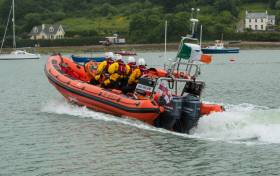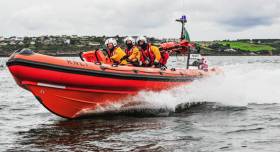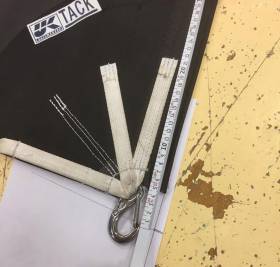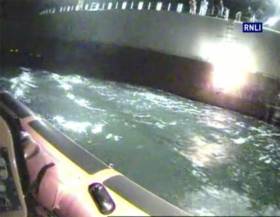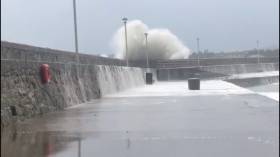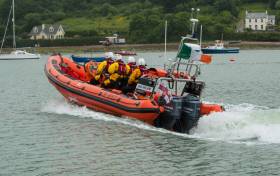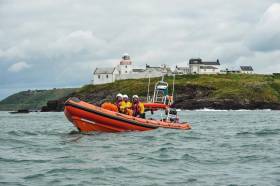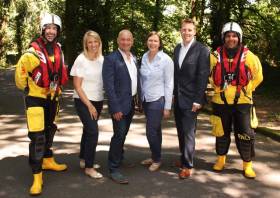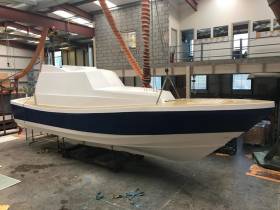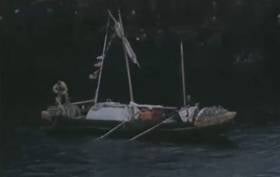Displaying items by tag: Crosshaven
Crosshaven Lifeboat Assists Yacht With ‘Smoke In Engine Bay’
Crosshaven RNLI has came to the aid of a sailor after his yacht got into difficulty off Cork Head on Friday (21 June).
The UK-registered yacht en route from Kinsale to Crosshaven broadcast a PAN PAN alert after its skipper spotted smoke in his engine bay.
Crosshaven’s crew of Warren Forbes, Denis Cronin, Aidan O’Connor and Derek Moynan were paged at 4.13pm and launched their inshore lifeboat to the reported position.
Once on scene, they assessed that there was no fire in the engine bay, but that the engine was disabled.
The casualty vessel was then towed to Crosshaven boatyard and safely berthed.
Crosshaven RNLI helm Warren Forbes said: “A fire onboard a vessel is a sailor's worst nightmare but fortunately no fire was observed when we arrived on scene.
“The yachtsman made the correct decision by not opening the engine bay and calling for help.”
More recently in Cork, Youghal RNLI launched in poor weather conditions yesterday (Sunday 23 June) to reports of a swimmer in trouble some 500m off Claycastle.
Fortunately the swimmer managed to get to safely back to shore as the inshore lifeboat arrived at the scene.
Crosshaven Lifeboat Assists Injured Fisherman Off Graball Bay
#Lifeboats - Crosshaven RNLI launched to the aid of an injured fisherman off Graball Bay yesterday morning (Thursday 14 March).
The volunteer crew of the Crosshaven inshore lifeboat, John and Janet, were paged at 10.27am to assist a 10m fishing vessel with an injured crewman onboard.
With Aidan O’Connor in command and Norman Jackson, Georgia Keating and Molly Murphy onboard, the lifeboat met with the incoming casualty boat off Graball Bay some 12 minutes later.
Two of the lifeboat crew transferred to the fishing boat to administer casualty care to the injured man, who was in severe pain from a suspected broken arm and a head injury.
As it was deemed too dangerous due to the sea state, and too painful for the casualty, to be transferred back to the lifeboat, the fishing vessel continued to Crosshaven under escort before the injured man was handed into the care of paramedics for transfer to hospital.
Speaking following the callout, Crosshaven RNLI deputy launching authority Hugh Mokler said: “The volunteer crew responded quickly and made the casualty, who was in a great deal of pain as comfortable as possible until they were able to hand over to the ambulance service. Today, their casualty care training made a difference.”
Elsewhere, the body of a West Cork fisherman was recovered from the shoreline at Killybegs, shortly after he was reported missing yesterday afternoon.
As BreakingNews.ie reports, the man in his 50s had been working on a Cork-based boat that was docked in the Donegal fishery harbour.
UK Sailmakers Ireland Renews Its In-House Certification
Rob Taylor from the Royal Yachting Association (RYA) was at UK Sailmakers Ireland loft in Crosshaven yesterday (Wednesday 23 January) for the refreshing of its In-House Certification (IHC).
UK Sailmakers in Crosshaven is the only IHC loft in Ireland – since Des McWilliam's days – and must renew this status every four years as per World Sailing requirements.
To that end, Rob Taylor from the RYA was in Crosshaven yesterday to check over the loft’s records and measurement methods to confirm the required consistency with worldwide practice.
This ensures that if you are measured at events such as the IRC Europeans or Cork Week, the methods and results those measurers get are the same as those taken on the UK Sailmakers Ireland loft floor.
Crosshaven Lifeboat In Early-Morning Medevac For Ill Trawlerman
#Lifeboats - The first callout of 2019 for the RNLI crew at Crosshaven was a medevac for a fisherman taken ill on a large fishing vessel in the early hours of Sunday 6 January.
Shortly after 5.30am volunteers from Crosshaven RNLI were paged and requested by the Irish Coast Guard to go the assistance of an ill crew member onboard a UK-registered supertrawler two miles south of Roches Point.
The inshore lifeboat, with Ian Venner in command and Derek Moynan, Caomhe Foster and Alan Venner onboard, were quickly under way and met with the ship at 6.10am.
Having assessed the situation, the lifeboat crew swiftly evacuated the ill man back to station in Crosshaven before handing him into the care of National Ambulance Service paramedics.
Speaking following the callout, Crosshaven RNLI lifeboat operations manager Patsy Fegan said: “We would like to wish the casualty a speedy recovery and thank our crew. Our hats are off to them.
“It’s a shock to the system to be awoken from a deep sleep by your pager and be on a lifeboat within 10 minutes but this is what our volunteers are willing and prepared for in order to help someone in need.”
Shore crew on Sunday morning were Gary Heslin, Molly Murphy, Jonathan Birmingham and James Fegan.
Irish Coast Guard Responds To Storm-Related Incidents
Irish Coast Guard teams across Ireland have responded to incidents related to the extreme conditions brought by Storm Diana over the last two days.
Dun Laoghaire Coast Guard was tasked at lunchtime on Tuesday (27 November) to extract a member of the public that had walked out the South Bull wall during stormy conditions.
The safest option in that situation was the casualty to take shelter until the tide dropped.
Yesterday afternoon (Wednesday 28 November), the team was called out to the Shankill shoreline close to Shanganagh Water Treatment plant to reports of a vehicle submerged in water with person a trapped.
Dun Laoghaire Coast Guard were tasked immediately along with Rescue 116 from Dublin Airport and Dun Laoghaire RNLI. While crews were responding to the incident, the casualty was rescued by his colleagues. All crews were stood down.
Shortly after, Dun Laoghaire Coast Guard was tasked to another incident at the town’s East Pier, where members of the public were stranded due to waves breaching the pier wall.
On arrival, Dun Laoghaire Coast Guard members identified a few members of public on the pier and advised them to relocate to a safer location.
Elsewhere, Crosshaven Coast Guard was tasked several times, starting on Tuesday evening with a person who had fallen overboard from a yacht and had been in the water for almost an hour.
The casualty was evacuated to Crosshaven RNLI’s lifeboat station, while the coastguard crew refloated their vessel that had gone aground.
Crosshaven was tasked again yesterday morning to recover a yacht after it broke its mooring near Drakes Pool. A tow was quickly established and casualty vessel brought to safety to a Royal Cork Yacht Club mooring.
The Irish Coast Guard strongly advises the public to stay away from exposed beaches, cliffs and piers, harbour walls and promenades along the coast during storm conditions.
Remember to Stay Back, Stay High and Stay Dry.
If you see someone in difficulty in the sea, or on the shore dial 999/112 and ask for the coastguard.
Crosshaven Lifeboat Rescues Man Whose Lifejacket Failed To Inflate
A man who fell overboard from his vessel near Cork Harbour was lucky to escape relatively unscathed after his lifejacket failed to inflate.
Crosshaven’s volunteer RNLI crew were requested to launch their inshore lifeboat at 5.20pm yesterday evening (Tuesday 27 November) to reports of a person shouting for help at Drakes Pool, a mile upriver from the lifeboat station.
On arrival, it was found the casualty had managed to remove himself from the water and onto another moored vessel after being in the water for up to 30 minutes, and was extremely cold and hypothermic.
The casualty was immediately evacuated to the lifeboat station where he was assessed by Dr John Murphy, Crosshaven RNLI’s doctor, and put into a hot shower before being taken by ambulance to Cork University Hospital for further evaluation.
Speaking following the the callout, Phil Maguire, Crosshaven RNLI Deputy Lifeboat Press Officer said: “We wish the casualty well following what must have been a frightening experience.”
The casualty was wearing a lifejacket, but this failed to inflate — highlighting the importance of getting your safety equipment checked and kept in good order.
Crosshaven Lifeboat Launched To Angling Boat Aground On Black Rock
#RNLI - While on exercise yesterday afternoon (Sunday 2 September), the volunteer crew Crosshaven RNLI overheard a radio transmission to the coastguard explaining that a 23ft angling boat was aground on Black Rock near Whitegate oil refinery in Cork Harbour.
As it happened, the lifeboat was close by and immediately responded to the angling boat, with two persons on board, which had run hard aground.
Trying to tow the vessel would have caused damage. Instead, the crew were taken off and an anchor set on the casualty boat before it reflected on the next high tide. The anglers were then transferred to Aghada Pier.
The callout came just a day after Crosshaven’s lifeboat volunteers launched on a medevac to a Belfast angler bitten by a blue shark off Roches Point.
Elsewhere, Skerries RNLI rescued a man and two children on Saturday evening (1 September) after their motorboat suffered mechanical failure.
Skerries RNLI were tasked after Dublin Coast Guard received a 999 call from a member of the public that there were an adult and two children in difficulty in a personal watercraft off the south strand in Skerries.
The volunteer crew launched their Atlantic 85 Inshore lifeboat Louis Simson and made their way towards the area indicated by the caller.
Once on scene, the crew began a quick search of the area and quickly ascertained that the vessel in difficulty was in fact a small motorboat rather than a personal watercraft.
The boat had suffered mechanical failure and was unable to make their way ashore. A tow was set up and the boat was brought safely back to the slipway in Skerries. Conditions at the time were fair with a force one to two southerly breeze.
“It was great to see everyone on board the vessel wearing good lifejackets,” said Skerries RNLI press officer Gerry Canning. “Also, the person who called it in wasted no time in dialling 999 and asking for the Coast Guard once they spotted someone in trouble.
“It’s great to see that people are taking the safety messages on board and are all playing their part in helping us save lives at sea.”
Cork Lifeboat Lunch Returns To Raise Vital Funds For The RNLI
#RNLI - The hugely successful Cork RNLI charity lunch and auction is set to return after an absence of five years.
The revamped fundraiser for Baltimore, Crosshaven and Kinsale’s RNLI lifeboat stations will take place in the 18th century mansion now home to the Maryborough Hotel in Douglas on Friday 5 October.
Cork has a long and proud association with the RNLI which goes back generations. The men and women who volunteer as lifeboat crew come from local communities and give hours of their time and dedication to the charity.
From the rescue of the Rambler crew by Baltimore RNLI during the Fastnet Race, to rescues of fishermen, divers, swimmers and boaters, the lifeboats and their crew provide an invaluable service.
Last year the Baltimore, Crosshaven and Kinsale RNLI lifeboat stations launched 86 times and brought 116 people to safety. Not every callout is life and death, but to the people involved in every mission, the lifeboats are their lifeline in times of trouble on the water.
The lunch and auction will get underway at 12.30pm with guests welcomed in the Orangery to the accompaniment of live music from Conor Ocean. This will be followed by a three-course lunch in the Sherrard Suite at 1.30pm.
Master of ceremonies Alan Shortt will provide the entertainment and lead the post-lunch auction and draw. The event will finish at 4pm.
RNLI fundraising committee members Avril O’Brien and David Doherty are looking forward to what promises to be an event to remember.
“We are delighted to reintroduce the RNLI lunch and auction,” Avril said. “It was always a popular occasion and as well as raising vital funds it became a highly anticipated social and networking event.
“Volunteer lifeboat crew give so much to the RNLI in terms of their time and dedication to the service and they need to be supported with the best in kit and equipment. Every person who buys a ticket to the fundraiser or bids on an auction item will have the knowledge that they are helping save lives at sea.”
Tickets priced at €65 are now on sale online via Eventbrite and will be sold in tables of 10. For more information about the event contact RNLI Munster community fundraising manager Mary Creedon at [email protected]
#Safehaven - Safehaven Marine’s latest projects include a pilot boat for Malta and a survey catamaran for the UK's Royal Navy.
The Interceptor 48 pilot boat currently in production at Safehaven’s Cork Harbour boatyard is their third boat supplied to Malta Maritime Pilots in Valletta.
The all-weather vessel will add to a number already in service for ports in the Mediterranean.
An Interceptor 48 Pilot Boat currently in production for operations in Malta. This is the third pilot boat supplied to Malta by Safehaven pic.twitter.com/nYikTUk9xj
— Safehaven Marine (@SafehavenMarine) November 3, 2017
The performance boat builder has also posted video of construction on their Wildcat 60 order for the Royal Navy, showing the installation of its Volvo D16 750hp engines and jets.
Our Wildcat 60 for @RoyalNavy under construction showing engines and jets being installed #madeincork @AfloatMagazine @mbytimeinc pic.twitter.com/rQMm5niKlF
— Safehaven Marine (@SafehavenMarine) November 4, 2017
Earlier this year, the Geological Survey of Ireland took delivery of their own Wildcat 60 for offshore and shallow water coastal surveys, as previously reported on Afloat.ie.
Pat Lake RIP
The death has occurred unexpectedly in Cork of one of the most respected figures in boat building in Pat Lake, who led Castlepoint Boatyard in Crosshaven for many years before his retirement a decade ago.
Pat had been a major figure in boat building and the maritime scene. His record includes many achievements, not least of which was his involvement in the building of the leather boat at Crosshaven Boatyard for the famous St Brendan recreation voyage in 1976.
Pat Lake died at St Finbarr’s Hospital in Cork. He is reposing at Forde’s Funeral Home, Old Waterpark, Carrigaline. Removal tomorrow (Sunday 17 September) at 5pm to St Brigid’s Church, Crosshaven. Requiem Mass on Monday (18 September) at 11.30am; funeral afterward to St Patrick’s Cemetery.


























